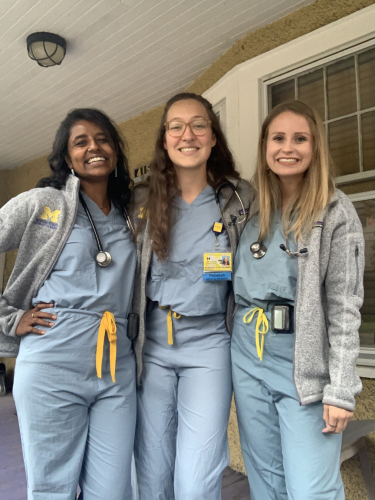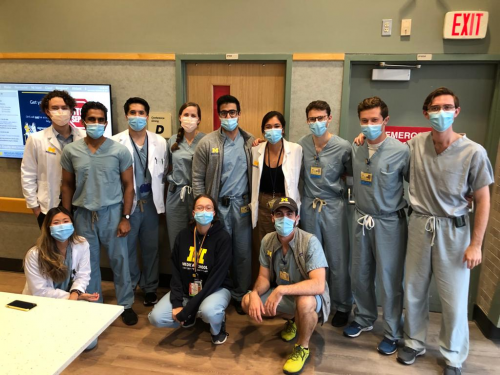When I first considered medical school, I knew nothing about what I was getting myself into. I was a senior in high school ready to go halfway across the country to attend college. I really loved to travel, play volleyball, and play the cello. I also loved biology and somehow, I really don’t remember exactly what did it, I settled on medicine as a future career. I had no idea what was in store. My parents were both teachers, and they encouraged education in its highest form, but I didn’t have any role models in medicine growing up. My uncle is a physician, as are a few of my cousins, but they lived far away and I didn’t know much about what they did on a day-to-day basis. Some of my friends’ parents were doctors, but I didn’t understand or know enough to ask questions about what their lives looked like. All I knew was medicine could be a way to help make people’s lives better. I went off to college assuming I would figure it out at some point.

My roommates and I (center) on our first day of clinical year, trying on our new scrubs.
In college, premedical students were many and opportunities were few. Due to my interest in global health, I joined the International Studies major and was set off on a premedical track for non-STEM majors. I loved my classes, but I was mostly disconnected from other students considering medicine. I read online about how to get into medical school and realized I was woefully behind on experiences, so I tried to shadow or find research opportunities. When I tried to apply for an opportunity to shadow, I was rejected due to my lack of prior experience. When I looked into mentoring, I was greeted with wonderful premedical advisors but a paucity of current medical students and residents to talk to about their experiences. I left college with many more questions, hoping I would find some answers in medical school.
It is no secret that prospective medical students who don’t come from physician families are at a disadvantage. In 2015, the American Medical Association estimated that 1 in 5 medical students has a parent that is a physician. Besides financial advantage, having physicians in the family gives prospective students more opportunity to shadow, find research, and engage with the profession earlier than others. There is a resource to ask questions and create connections, as well as someone to bounce ideas off of when considering medical school. When I thought of medicine, all I had to go on was TV shows like Grey’s Anatomy and House, hyper-realistic portrayals of a profession filled with danger, drama, and intrigue. I knew little of the reality I would find in medical school.
At the University of Michigan Medical School, we are given so many opportunities to find ourselves in the clinical setting, interacting with real patients and providers. The school understands this differential that exists between those with and without doctors in their families, and they strive to close that gap with early programming and clinical experiences. A lot of my early exposure came from individuals that weren’t physicians. For example, as part of the Interprofessional Clinical Experience (now Interprofessional Collaborative Skills – ICS), I shadowed a social worker for a day of family meetings, getting to interact with patients and their loved ones during the hardest moments of their lives. I got to follow a patient advocate as they visited teenagers during chemotherapy, providing companionship, checking in on them, and answering questions about care. As I followed these professionals through the winding, confusing maze of the hospital I could finally see myself in these halls. I could see myself providing care to these patients one day, because now I knew what it might look like.
I also participated in the Clinical Reasoning Elective (CRE) as an M1. This experience allows first-year students to practice their clinical interviewing skills in pairs with support from a faculty mentor. Due to COVID-19, I only ended up completing one shift of the elective, but it was a memorable one. It was my first time in an emergency department, and it was a very busy day, full of trauma patients and beds lined up in the hallways. I was caught in the middle of a storm, overwhelmed by all the activity around me and unsure how to find my place in it all. In a valiant attempt to make me feel useful, my preceptor convinced me it was crucial to go into a patient’s room to listen to a heart murmur and ask about their medical history. I stood outside the door in the hallway for 15 minutes working up the courage to go inside, and once I made it in I spent 20 minutes stumbling over my words and embarrassing myself. Later, debriefing with my preceptor, I realized I had done a patient interview for the first time on a real patient. I was finally learning what life might be like as a physician.

My track on the last day of clinical year (Track G!)
Now, I am an M3 and have just finished my M2 clinical year, a whirlwind of patient care in hospitals and clinics around Ann Arbor. I have assisted with 8-hour long surgeries, delivered babies, diagnosed illness, counseled patients on lifestyle or dietary changes, and participated in so many lifechanging moments. This morning I walked into my first clinical day as an M3 and felt confident – I knew how to use our electronic medical record, I knew how to navigate the halls of the hospital, and I walked right in a patient’s room, after knocking of course. I am well on my way to becoming a physician that the high school version of myself would have not thought possible.
As a prospective student, it is okay to be overwhelmed and have a million unanswered questions. Here at Michigan, you will find the answers through early patient interaction, experience in the hospital, and clinical role models everywhere you turn. You will be part of a supportive, diverse community looking to lift each other up and full of career-changers, non-STEM majors, and those who had never known a single person in the health care field. You will find success through programs like the ICS and CRE, and you will one day find yourself as a mentor to premedical students that were in your shoes not too long ago.
Don’t miss the next Dose of Reality.
Rebekah Sugarman is a third-year student at the University of Michigan Medical School. She is originally from New York and spends her days doing crossword puzzles, cooking elaborate meals for her friends, and singing. She plans to pursue a career in primary care with additional work in health policy.
